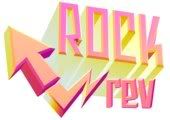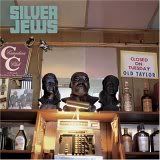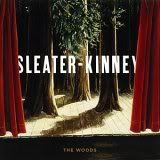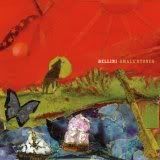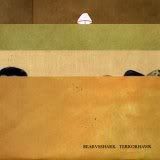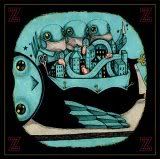Why?_(2005) "Elephant Eyelash" [7.5/10]
 | Why? Album: "Elephant Eyelash" Release Date: 2005-10-04 Label: Anticon Rev Value: [7.5/10] Genre: Rock Styles: Alternative Pop/ Rock, Indie Rock Buy It |
Tracklist:
1 Crushed Bones (3:30)
2 Yo Yo Bye Bye (2:51)
3 Rubber Traits (4:01)
4 Hoofs (1:57)
5 Fall Saddles (2:43)
6 Gemini (Birthday Song) (5:27)
7 Waterfalls (2:50)
8 Sand Dollars (3:44)
9 Speech Bubbles (2:57)
10 Whispers into the Other (3:27)
11 Act Five (3:20)
12 Light Leaves
review by:Pitchfork
reviewer: Chris Dahlen, October 11, 2005
Album Value: (7.8/10)
I'll admit that I didn't "get" Why? on his early records, like that split EP with Odd Nosdam from 2001, where his puzzling lyrics and images are as fragmented as the clips of music he samples. It was like listening to the kids outside your window who are locked into their own in-jokes and use their own slang for sex acts: I just figured, you either get it or you're out. Somehow, his farther-out colleague and cLOUDDEAD partner Doseone was easier to follow, maybe because his jester act steers you more directly to his heart.
Dose has said about Why?, "I met him at 18 and he was 40." And you get that vibe from Why?, aka Yoni Wolf, more on every album. On Elephant Eyelash, Why? has moved even closer to using plain old song forms and he formed a live band to play them that includes Wolf's brother Josiah on drums, guitarist Matt Meldon, and Doug McDiarmid on anything else. Recorded in DIY lo-fi, they have better chemisty than when they debuted on the Sanddollars EP earlier this year. In fact, Wolf shrugged off his Why? alias and turned it into the name of his band-- which may violate the Hip-Hop Local 712 union regulations, but what the hey, they're underground.
In fact, forget about whether Wolf's career belongs in hip-hop or indie rock or jangle-psych or whatever: By now his music has oozed so far away from a clear-cut genre that the whoom-pa beats he's sometimes fond of could have been inspired by polka. The same goes for his fully-developed, fully-original vocals. His speak-singing lays packages of words one after another with attention to every syllable, dropping them in sequence like he's laying a stone path. But his pop songs showcase his singing, which starts off like he's reading his journal to a bored girlfriend, then takes flight in an impassioned croon.
Elephant Eyelash sounds less crisp and less striking than the folk-plus-beats arrangements of 2003's Oaklandazurasylum, but it brings more heart; where that earlier album's lyrics crackled with the anxiety of beating yourself up after a bad day at school, Elephant Eyelash soars like the last songs on prom night.You'll still puzzle over the lyrics-- Wolf says he's writing about a break-up, though don't let that limit your imagination-- but the emotional intent is blindingly clear. The music pours and soars over the splintered images, like on 'Sanddollars, which uses a triumphantly conventional pop anthem to make its chorus sound like a mountaintop declaration: "These are selfish times/I've got shellfish dimes/ And sanddollars." Yet he tops that with the huge, heart-pounding piano chords on "Rubber Traits", which propel him as he belts: "Unfold an origami death mask/ And cut my DNA with rubber traits/ Pull apart the double helix like a wishbone/ Always be working on a suicide note." And I finally understand how he feels.)
Full Review
review by: Dusted
reviewer: Charlie Wilmoth - Aug. 22, 2005
Album Value: (-/-)
The name Why? once referred to Anticon collective and Clouddead member Yoni Wolf, who released a string of rough-and-ready records that mixed elements of hip-hop and indie rock. Why?'s earlier output was fun - Wolf jumped among genres like the older, lo-fi Beck, but with less obvious irony and less of a folk influence. But those records weren't as fun as they could have been, because Wolf often tried to wring too much out of too few ideas, because his arrangements were a bit thin, and because he had one of the tiniest, weakest voices in the history of hip-hop.
The name Why? now refers to an entire Bay Area rock band, fronted by Wolf and including guitarist Matt Meldon, multi-instrumentalist Doug McDiarmid, and drummer Josiah Wolf (Yoni's brother). For whatever reason - perhaps the new lineup has something to do with it - Elephant Eyelash is fantastic, an indie rock record that nicely balances absurdity and directness, pop hooks with stoned weirdness.
Yoni Wolf's hip-hop roots (if indeed Clouddead counts as hip-hop) are mostly buried here - even the half-spoken rhymes on "Crushed Bones" and "Gemini (Birthday Song)" are accompanied by guitar arpeggios. Wolf sings melodies much of the time (in a stronger voice than before, although he's still no Sinatra), and the songs are mostly shaped like pop rather than hip hop, with verses and choruses taking similar amounts of time.
The result is indie rock that's quirky and seemingly casual in a way that makes the catchy parts (and there are many) seem catchier, a little like Pavement in their prime. The instrumental part on "Gemini" is similar to Pavement's "Range Life," in fact. Unlike Pavement, though, Why? gets a lot of mileage from samples and effects that augment their rock-band base. But the production doesn't feel digital at all, so the instruments and electronic touches both sound grainy, much like they do on Radiohead's OK Computer.
(...)
Full Review
review by: Prefix Mag
reviewer: Matthew Gasteier
Album Value: (3/5)
Why? (the singer, not the band) is most famous for his participation in Clouddead, the experimental hip-hop group that is proving increasingly influential. But Why? (born Yoni Wolf) has fashioned his solo project into a full-fledged band of the same name that includes Matt Meldon, Doug McDiarmid and his brother Josiah. On Elephant Eyelash, Wolf met halfway between his old group and his new bandmates, who seem to hail from somewhere in the Slanted Enchanted vicinity.
Shuttling between the multi-tracked free association of “Crushed Bones” and the summery pop of “Sanddollars” makes for a nice little trip through good enough indie rock, and by the time it’s over you’re just about ready for your mom to tuck you in and turn out the light. Not that there isn’t any emotional heft here, especially on album highlight “Gemini (Birthday Song).” This is an unambitious album in the best way. But then, Elephant Eyelash is an album for you to find and love for yourself if you are so inclined, so what can I do but sing along and nod?
Original Link
review by: Popmatters
reviewer: Josh Berquist
Album Value: (8/10)
After a number of beautifully flawed and fractured attempts, Why?'s Yoni Wolf finally realizes his hip-hop informed indie-pop aesthetic with Elephant Eyelash. While prior efforts were undercut by his impulsive restlessness, Wolf harnesses his inherent affinity for aberration and abstraction and directs it into an album that is more engrossingly O.C.D than aversively A.D.D. While still retaining every endearing idiosyncrasy, he exhibits unprecedented restraint over song structure and subject matter allowing his masterful word working to take its rightful prominence. This newfound focus makes Elephant Eyelash even more accessible than Wolf's previous output yet proves itself every bit as adventurous.
Even at his onset, Wolf distinguished himself from fellow Anticon alumni like Sole and Doseone by being much more They Might Be Giants than Deep Puddle Dynamics. That pop playfulness was plagued by Wolf's willfully chaotic compositions of unresolved movements leapfrogging over each other at whimsy. Backed by a capable and collaborative band, Wolf elaborates on these truncated tune fragments and sustains them over an intended trajectory. Rather than the sudden swelling and hasty deflation of his early work, these songs surge into the cathartic pop that was all too often absent in the past. Although they may be more coherent, these arrangements are still hardly conventional or commonplace; brushed snare reggae rolls offset the plaintive acoustic arpeggiation at the onset of "Crushed Bones" and rollicking carnival runs punctuate the piano ballad of "Fall Saddles".
These songs bolster an improved sense of subject matter in Wolf's work. His defining "coffee's turned my darkness into Woody Allen long-sigh anxiety" obsessions with leaving lovers, sex, and death remain but trimmed away are all the absurd and impenetrably personal references to things like cat food bowls and shirtless frisbee players. Wolf keeps his focus fixed on readily identifiable if albeit aching themes and refrains from the overtly and overly intimate details that had him censoring his own vocals on his last album. Of course there's still plenty of embarrassment and awkwardness in play through numerous references to masturbation and ruminations on spent semen. Even then, Wolf avoids outright obnoxiousness with winking playfulness.(...)
Full Review
review by: Almostcool
reviewer: ???
Album Value: (7.25/10)
The Anticon crew have never been ones to create hip-hop according to what is expected of the genre, and Why? is no different. In fact, one could argue that on his past couple releases he's very nearly created an entirely new genre that is grounded in indie rock, but dips into hip-hop and several other genres for something that's refreshing and unique (but maybe a bit frustrating for fans of one genre or the other without an open mind to accept the other). Elephant Eyelash is no different, with Why? pulling together all his previous influences into something even more focused and cohesive.
The release follows up closely on the Sanddollars EP, which came out only a couple months back, but is leaps and bounds beyond that effort in most respects. Yes, the almost nonsensical, stream-of-consciousness lyrics are still there, but the sense of songwriting, melody, and even depth of instrumentation has been expanded upon. "Crushed Bones" opens the release with lyrics that seem to touch on past drug abuse, and the song lopes along with skittery programmed beats and some dense layers of guitars while "Yo Yo Bye Bye" opens with pretty ambience and piano melodies with almost slurring vocals before chugging into almost bombastic refrains that drive home the odd (and often clever) lyrics even more.
Tracks just keep on throwing out interesting bits after that, with "Rubber Traits" dropping some of the weirdest lyrics of the album alongside some chopped-up indie guitar instrumentation while "The Hoofs" drops glittery chimes and squiggling electronics alongside acoustic guitars and the nasally vocals of Yoni Wolf (one of four members of Why?). One of the highlights of the entire album, though, is the insanely poppy (and catchy) "Gemini (Birthday Song)," which drops lyrics that reference the album title. As with just about every track, the actual lyrics are nearly indecipherable, but they (and the instrumentation) are absolutely buoyant in terms of overall feel, and the joyous tracks is easily one of the best things that Why? has done to date.
Once "Sanddollars" (from the aforementioned EP) hits, the album takes a distinct turn towards more straightforward sounds, and the overall release suffers a bit. For several tracks in a row, the album takes on a much more straightforward indie rock feel with a few strange bits and the typically odd vocals and lyrics thrown in for good measure. Coming after the inventive and infectious opening seven tracks, it's a bit of a letdown finish. That said, I've still got to give Why? some props for continuing to defy any genre boundaries in throwing hip-hop, folk, indie rock, and a dash of electronics in the cuisinart and molding the final concoction into something so darn great at times.
Original Link
review by: Hour
reviewer: Steve Guimond
Album Value: (3/5)
"I'm f***ing cold like a DQ Blizzard/ you act like a slut but you're really a freezer." What the?! Lines like this threw me off from the start - vocally weak, lyrically childish and lame. Too bad, because Yoni Wolf - cLOUDDEAD, Hymie's Basement - and his Why? project display an interesting amalgam of Beach Boy sunny harmonies and instrumentation, hip-hop beats and rhymings and neo-psychedelic pop traits. Having recently evolved out of a solo vision to full-band status, Why? continue Anticon Records' tradition of musical challenges, really only falling short in one very important category.
Original Link
